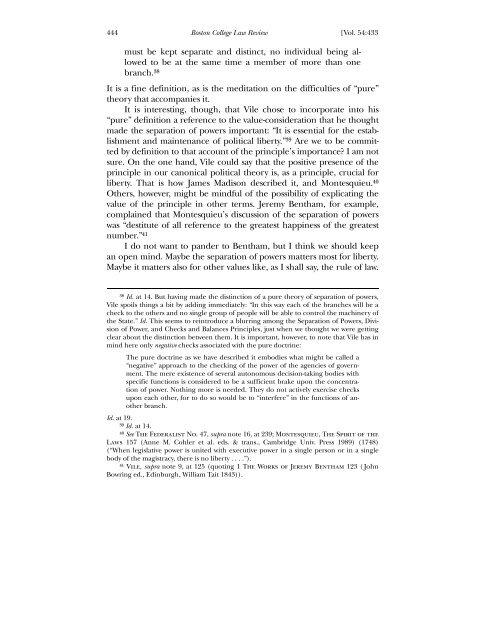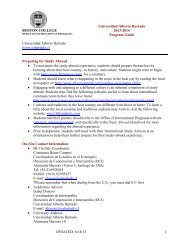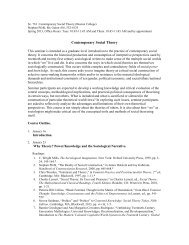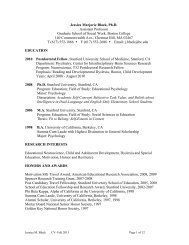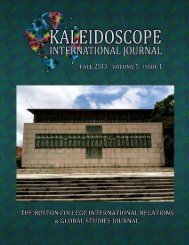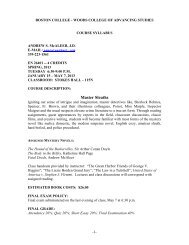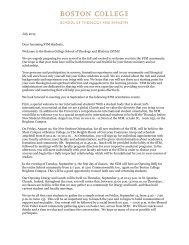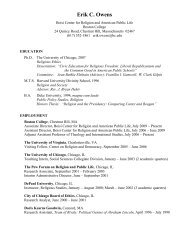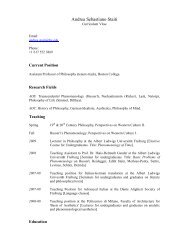separation of powers in thought and practice? - Boston College
separation of powers in thought and practice? - Boston College
separation of powers in thought and practice? - Boston College
You also want an ePaper? Increase the reach of your titles
YUMPU automatically turns print PDFs into web optimized ePapers that Google loves.
444 <strong>Boston</strong> <strong>College</strong> Law Review [Vol. 54:433<br />
must be kept separate <strong>and</strong> dist<strong>in</strong>ct, no <strong>in</strong>dividual be<strong>in</strong>g allowed<br />
to be at the same time a member <strong>of</strong> more than one<br />
branch.38<br />
It is a f<strong>in</strong>e def<strong>in</strong>ition, as is the meditation on the difficulties <strong>of</strong> “pure”<br />
theory that accompanies it.<br />
It is <strong>in</strong>terest<strong>in</strong>g, though, that Vile chose to <strong>in</strong>corporate <strong>in</strong>to his<br />
“pure” def<strong>in</strong>ition a reference to the value-consideration that he <strong>thought</strong><br />
made the <strong>separation</strong> <strong>of</strong> <strong>powers</strong> important: “It is essential for the establishment<br />
<strong>and</strong> ma<strong>in</strong>tenance <strong>of</strong> political liberty.”39 Are we to be committed<br />
by def<strong>in</strong>ition to that account <strong>of</strong> the pr<strong>in</strong>ciple’s importance? I am not<br />
sure. On the one h<strong>and</strong>, Vile could say that the positive presence <strong>of</strong> the<br />
pr<strong>in</strong>ciple <strong>in</strong> our canonical political theory is, as a pr<strong>in</strong>ciple, crucial for<br />
liberty. That is how James Madison described it, <strong>and</strong> Montesquieu.40<br />
Others, however, might be m<strong>in</strong>dful <strong>of</strong> the possibility <strong>of</strong> explicat<strong>in</strong>g the<br />
value <strong>of</strong> the pr<strong>in</strong>ciple <strong>in</strong> other terms. Jeremy Bentham, for example,<br />
compla<strong>in</strong>ed that Montesquieu’s discussion <strong>of</strong> the <strong>separation</strong> <strong>of</strong> <strong>powers</strong><br />
was “destitute <strong>of</strong> all reference to the greatest happ<strong>in</strong>ess <strong>of</strong> the greatest<br />
number.”41<br />
I do not want to p<strong>and</strong>er to Bentham, but I th<strong>in</strong>k we should keep<br />
an open m<strong>in</strong>d. Maybe the <strong>separation</strong> <strong>of</strong> <strong>powers</strong> matters most for liberty.<br />
Maybe it matters also for other values like, as I shall say, the rule <strong>of</strong> law.<br />
38 Id. at 14. But hav<strong>in</strong>g made the dist<strong>in</strong>ction <strong>of</strong> a pure theory <strong>of</strong> <strong>separation</strong> <strong>of</strong> <strong>powers</strong>,<br />
Vile spoils th<strong>in</strong>gs a bit by add<strong>in</strong>g immediately: “In this way each <strong>of</strong> the branches will be a<br />
check to the others <strong>and</strong> no s<strong>in</strong>gle group <strong>of</strong> people will be able to control the mach<strong>in</strong>ery <strong>of</strong><br />
the State.” Id. This seems to re<strong>in</strong>troduce a blurr<strong>in</strong>g among the Separation <strong>of</strong> Powers, Division<br />
<strong>of</strong> Power, <strong>and</strong> Checks <strong>and</strong> Balances Pr<strong>in</strong>ciples, just when we <strong>thought</strong> we were gett<strong>in</strong>g<br />
clear about the dist<strong>in</strong>ction between them. It is important, however, to note that Vile has <strong>in</strong><br />
m<strong>in</strong>d here only negative checks associated with the pure doctr<strong>in</strong>e:<br />
The pure doctr<strong>in</strong>e as we have described it embodies what might be called a<br />
“negative” approach to the check<strong>in</strong>g <strong>of</strong> the power <strong>of</strong> the agencies <strong>of</strong> government.<br />
The mere existence <strong>of</strong> several autonomous decision-tak<strong>in</strong>g bodies with<br />
specific functions is considered to be a sufficient brake upon the concentration<br />
<strong>of</strong> power. Noth<strong>in</strong>g more is needed. They do not actively exercise checks<br />
upon each other, for to do so would be to “<strong>in</strong>terfere” <strong>in</strong> the functions <strong>of</strong> another<br />
branch.<br />
Id. at 19.<br />
39 Id. at 14.<br />
40 See The Federalist No. 47, supra note 16, at 239; Montesquieu, The Spirit <strong>of</strong> the<br />
Laws 157 (Anne M. Cohler et al. eds. & trans., Cambridge Univ. Press 1989) (1748)<br />
(“When legislative power is united with executive power <strong>in</strong> a s<strong>in</strong>gle person or <strong>in</strong> a s<strong>in</strong>gle<br />
body <strong>of</strong> the magistracy, there is no liberty . . . .”).<br />
41 Vile, supra note 9, at 125 (quot<strong>in</strong>g 1 The Works <strong>of</strong> Jeremy Bentham 123 ( John<br />
Bowr<strong>in</strong>g ed., Ed<strong>in</strong>burgh, William Tait 1843)).


